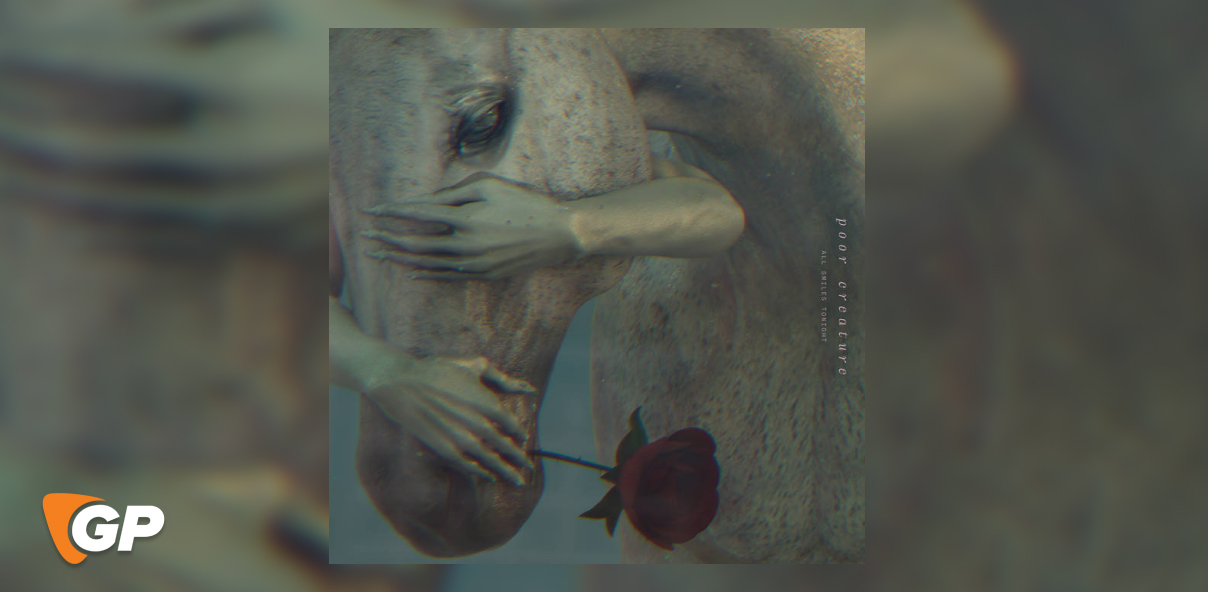Poor Creature’s place within the Irish folk revival is an intriguing one. They neither crash through the walls of tradition like The Scratch nor revel in the bawdy, beer-soaked communion of The Mary Wallopers. Nor do they fully embrace the grand, droning theatricality of Lankum or the spectral intensity of John Francis Flynn. Instead, Ruth Clinton (Landless), Cormac MacDiarmada (Lankum), and John Dermody (Spook of the Thirteenth Lock) approach folk tradition with a quiet, forensic patience. Their new album, All Smiles Tonight, isn’t an act of reinvention so much as an act of distillation.
The record opens with “Adieu Lovely Erin,” a shimmering lament that feels less sung than summoned. Clinton’s voice, fragile and unwavering, drifts over an ambient drone, turning a familiar emigration ballad into a kind of secular hymn. Immediately, the album sets itself apart as an exercise in minimalism, where every note is a held breath. “Bury Me Not” continues in this vein. A standard of maritime folk, Poor Creature strip it back to bare bones, reimagining it as a ghost story set to a pulse of skeletal percussion. Critics have lauded its transformation into a haunted meditation, where layered vocals hover like phantoms over the wreckage of tradition.
“The Whole Town Knows,” though often mislabelled as the album’s opener, is a pivotal centrepiece. A song with roots in Begley and Lynam’s buoyant delivery, it is here rendered slow and resigned. The jaunty rhythms are gone; in their place, a raw tension hums beneath the surface, as if the song itself is holding something back. With “Lorene,” a cover of The Louvin Brothers, the album reaches its most bare and intimate point. MacDiarmada’s vocals are delivered with an almost painful tenderness, floating over skeletal guitar and ambient synth textures. The song’s inherent sadness is not amplified but rather allowed to sit, exposed and unadorned.
“An Draighneán Donn,” is perhaps the album’s most radical moment. The familiar Irish ballad is submerged under layers of droning harmonies and oscillating synths, stretched into a kind of hypnotic unease. It exemplifies Poor Creature’s approach: not to embellish tradition, but to disassemble it and let its bones speak. The title track, “All Smiles Tonight,” serves as a brief, glimmering respite. Warm harmonies intertwine over a simple, lilting arrangement. Yet even in its levity, there’s an undercurrent of spectral distance, as though the song might evaporate if listened to too intently.
On “Hick’s Farewell,” the band take Doc Watson’s Appalachian classic and drape it in shoegaze textures. What begins as a slow-burning dirge builds through subtle layering into a wall of sound, never losing its mournful centre but carrying an almost cinematic sense of propulsion. The album closes with “Willie-O,” a ten-minute epic that takes the group’s minimalist aesthetic to its logical conclusion. Drones intensify, melodies unravel, and by the time the track collapses into near-silence, the listener is left suspended in a kind of reverent stasis. It is not a climax but an evaporation.
All Smiles Tonight is not a record of immediacy. Its power lies in its patience, its willingness to linger in silences and let the listener come to it. There are no dramatic flourishes or bombastic reinterpretations here. Rather, Poor Creature allow the tradition to breathe, to fragment, and to reform in the listener’s mind.
In an Irish folk scene currently enamoured with grandeur, theatricality, and spectacle, Poor Creature have chosen to whisper. In doing so, they carve out a space that feels quietly radical. All Smiles Tonight is a record that doesn’t demand attention but earns it. It is folk music as echo rather than anthem, a persistent, intangible presence that lingers long after the final note.



